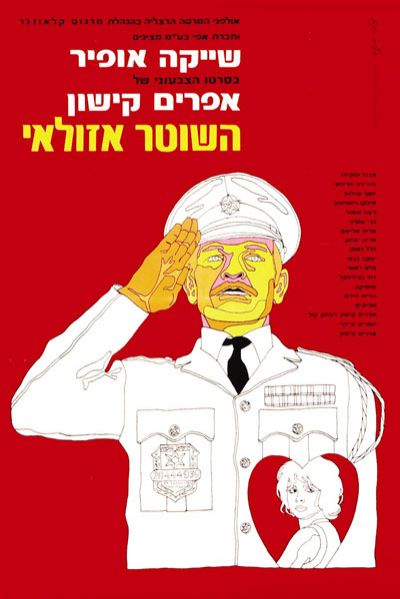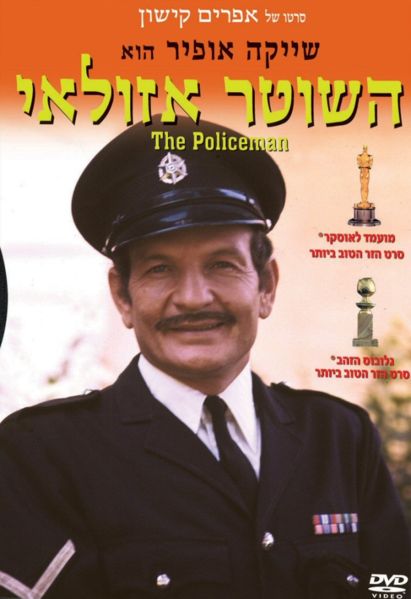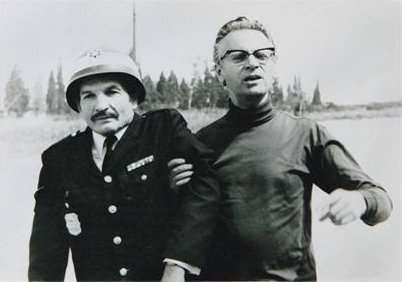
Azulai ist ein Polizist in Jaffa, dessen Inkompetenz nur von seiner Weichherzigkeit übertroffen wird. Seine Vorgesetzen wollen ihn in Frühpension schicken, aber er will bei der Truppe bleiben. Und auch die Kriminellen von Jaffa wollen seine Pensionierung verhindern, denn mit ihm hatten sie immer ein leichtes Spiel. Sie planen deshalb, Azulai zu einem Erfolgserlebnis zu verhelfen. Doch dies ist gar nicht so leicht.
Für den Schauspieler geschrieben. Kishon war beeindruckt von dem schauspielerischen Talent inspiriert Herz erobert Charlie Chaplin. Nicht schön und unwichtig großer Schauspieler.
Thematisiert auch die Attentate, die es in Israel bereits viele Jahre vor der Intifada gab.
Polizist dessen schwäche es ist religiös zu sein, der eigentlich nicht geeignet ist für den Beruf des Polizisten. Eine menschliche Tragödie. Für die Orthodoxen ist es eine große Überraschung, dass er nicht nur die Bibel kennt, sie zitieren kann sondern sie selbst auch korrigieren kann und mit ihnen diskutieren kann. Eine rührende Komödie. Überraschend dass auch rührt. Das besondere, dass es eine menschliche Komödie ist. Enttäuscht bei Oskar, fast sicher, dass er ihn gewonnen hat. Zweiter Oscar-Nominierung. Willy Weiler Ben Hur: Junger Mann Sie sind ein bisschen deprimiert.
Schlaf gut, Wachtmeister wurde vielfach preisgekrönt. Es wurde für den Oskar nominiert und hat einen Golden Globe gewonnen. Es ist der erste Film, für den Kishon eine absolut neue Geschichte verfasste, der also nicht auf präexistenten Satire oder Humoreske basiert.

Der Film war ein Kassenschlager und erhielt auch exzellente Kritiken, wurde als ausländischer Film für den Oscar nominiert und gewann als ausländischer Film den Golden Globe. Beim Filmfestival von Barcelona wurde er als bester ausländischer Film ausgezeichnet, beim Festival von Monte Carlo wurde Kishon als bester Regisseur ausgezeichnet und in Atlanta bekam er den Preis der Jurie.
Kishon schnitt den Film ganz auf Shai K. Ophir zu, der bereits in zwei früheren Filmen von Kishon (Erwinke und Der Blaumilchkanal) mitgespielt hatte. An der Seite von Ophir spielen einige der Standardbesetzungen Kishons:
Zaharira Harifai Avner Hizkiyahu und an ihrer Seite Nitza Saul Joseph Shiloach und Itzko Rachamimov.
Die in Israel sehr beliebte Titelmusik schrieb Nurit Hirsch, der Liettext stammt von MNOR, und AOSHIK LEVY singt ihn im Film.
Der "Polizist Azolai ", wie der Film auf Hebräisch heißt, erzählt aus dem Leben von dem Polizisten Azolai, der es in zwanzig Dienstjahren nicht geschafft hat, über den Rang eines einfachen Polizisten hinauszukommen. Der wichtigste Grund dafür ist die Gutherzigkeit und Unschuld Azolais, der wegen seines mitfühlenden Herzens nicht in der Lage ist, Kriminelle einzusperren, ihnen jegliche Ausrede abnimmt.

describes his life of Azolai, policeman that not succeeded to cost over a degree of policeman from simple ape in each twenty years of his service in the police. The main reason so she is good his heart and innocence of Azolai, that he is not able to execute detentions on account of his compassionate heart and his readiness to believe also to the untruthful stories in the reality of the criminals in them encounters. His failures that return of Azolai in the destruction of the crime bring superintendent Lpkobits (Avner Hzkiho) and the symbol Bz'rno (will pour Rhmimob) to the conclusion that/because forbidden to renew contract employment of him, even their stage Ncmr upon him. In the meantime, Azolai that he is oblivious to the ruined Hmrhpt over his head, lovefalls by the prostitute of street by name since (Nitsa Shaul), fact her exposes his wife the bitter and the her engine to bear Bti (Zhrira Hripai). Bti rips to the carrots picture of since, but secretly Azolai pastes the picture newly. When it is clear Lazolai that/because he stands in front of dismissal, he tries in each his strength to register to win him an achievement that will leave the same in the police. The criminals of the large area in Jaffa and in their head Omer (Joseph is a dismissal) enlist to his help, and stage a deed of prima facie crime him will prevent Azolai, and all this without Shazolai the innocent will stand thereon that the crime are staged. After Shazolai the innocent almost topples deed of the staged crime he " thwarts " deed of the crime and winner the first time in the estimation of his colleagues and his commanders.
Aber Azolais Erfolg kommt zu spät: sein Vertrag wird nicht verlängert.
But the deed comes too late, and contract of Azolai is not from month. "The policeman Azolai " there was a column de deploys of Shika Ofir, and Kishon devoted in the love and without condition to the design of image of the policeman by Ofir as axis of the central motive in the plot. Ofir embodied Azolai like a person on the way dead end : Capture in the unapproved marriage and under pressure unceasing, inner and external, to do the one thing that he does not want and doesn't can do : To learn the game rules that via them progressive people alive. Azolai demonstrates in several crusts his ability to talk with different people Bshptm. He demonstrates a control in French when he is an instructor of policemen of guests from France that came to visit the staff of the police. When come the policemen to disseminate a demonstration of Orthodox Jews, he turns to the Orthodox Jews in Yiddish and demonstrates his informations by the went religion, and as such changes the violent demonstration to the conversation are intelligent. Over and over he demonstrates his ability to see the person that from after the role : The criminal, the prostitute, or the demonstrator for him people of his amount, is not beings of anonymity. A conception of Aolmo the pessimistic of Kishon expresses in his identification either " progress alive " or treading of other people. Azolai of Ofir is not able so. He prefers to tour by the nights as policeman from simple ape because the contact with other people accords him satisfaction. His penalty is consequence from track of life that is only/unique the possible for him. The scene of the conclusion of reputed the film to quarrel one of the scenes that is most that excite in the Israeli cinema. Azolai, that won finally to the increase in the degree but exempts, stands in the field that arrange of staff of the police in him pace the policemen of the trainees by the guidance of Bz'rno. When they commits/transits his face, they salute him by the order of Bz'rno, for the first time and recently in his life. Azolai salutes back/in return and the tears trickle from his eyes.
Aber Azolais Erfolg kommt zu spät: sein Vertrag wird nicht verlängert.
But the deed comes too late, and contract of Azolai is not from month. "The policeman Azolai " there was a column de deploys of Shika Ofir, and Kishon devoted in the love and without condition to the design of image of the policeman by Ofir as axis of the central motive in the plot. Ofir embodied Azolai like a person on the way dead end : Capture in the unapproved marriage and under pressure unceasing, inner and external, to do the one thing that he does not want and doesn't can do : To learn the game rules that via them progressive people alive. Azolai demonstrates in several crusts his ability to talk with different people Bshptm. He demonstrates a control in French when he is an instructor of policemen of guests from France that came to visit the staff of the police. When come the policemen to disseminate a demonstration of Orthodox Jews, he turns to the Orthodox Jews in Yiddish and demonstrates his informations by the went religion, and as such changes the violent demonstration to the conversation are intelligent. Over and over he demonstrates his ability to see the person that from after the role : The criminal, the prostitute, or the demonstrator for him people of his amount, is not beings of anonymity. A conception of Aolmo the pessimistic of Kishon expresses in his identification either " progress alive " or treading of other people. Azolai of Ofir is not able so. He prefers to tour by the nights as policeman from simple ape because the contact with other people accords him satisfaction. His penalty is consequence from track of life that is only/unique the possible for him. The scene of the conclusion of reputed the film to quarrel one of the scenes that is most that excite in the Israeli cinema. Azolai, that won finally to the increase in the degree but exempts, stands in the field that arrange of staff of the police in him pace the policemen of the trainees by the guidance of Bz'rno. When they commits/transits his face, they salute him by the order of Bz'rno, for the first time and recently in his life. Azolai salutes back/in return and the tears trickle from his eyes.
Aber Azolais Erfolg kommt zu spät: sein Vertrag wird nicht verlängert.
But the deed comes too late, and contract of Azolai is not from month. "The policeman Azolai " there was a column de deploys of Shika Ofir, and Kishon devoted in the love and without condition to the design of image of the policeman by Ofir as axis of the central motive in the plot. Ofir embodied Azolai like a person on the way dead end : Capture in the unapproved marriage and under pressure unceasing, inner and external, to do the one thing that he does not want and doesn't can do : To learn the game rules that via them progressive people alive. Azolai demonstrates in several crusts his ability to talk with different people Bshptm. He demonstrates a control in French when he is an instructor of policemen of guests from France that came to visit the staff of the police. When come the policemen to disseminate a demonstration of Orthodox Jews, he turns to the Orthodox Jews in Yiddish and demonstrates his informations by the went religion, and as such changes the violent demonstration to the conversation are intelligent. Over and over he demonstrates his ability to see the person that from after the role : The criminal, the prostitute, or the demonstrator for him people of his amount, is not beings of anonymity. A conception of Aolmo the pessimistic of Kishon expresses in his identification either " progress alive " or treading of other people. Azolai of Ofir is not able so. He prefers to tour by the nights as policeman from simple ape because the contact with other people accords him satisfaction. His penalty is consequence from track of life that is only/unique the possible for him. The scene of the conclusion of reputed the film to quarrel one of the scenes that is most that excite in the Israeli cinema. Azolai, that won finally to the increase in the degree but exempts, stands in the field that arrange of staff of the police in him pace the policemen of the trainees by the guidance of Bz'rno. When they commits/transits his face, they salute him by the order of Bz'rno, for the first time and recently in his life. Azolai salutes back/in return and the tears trickle from his eyes.